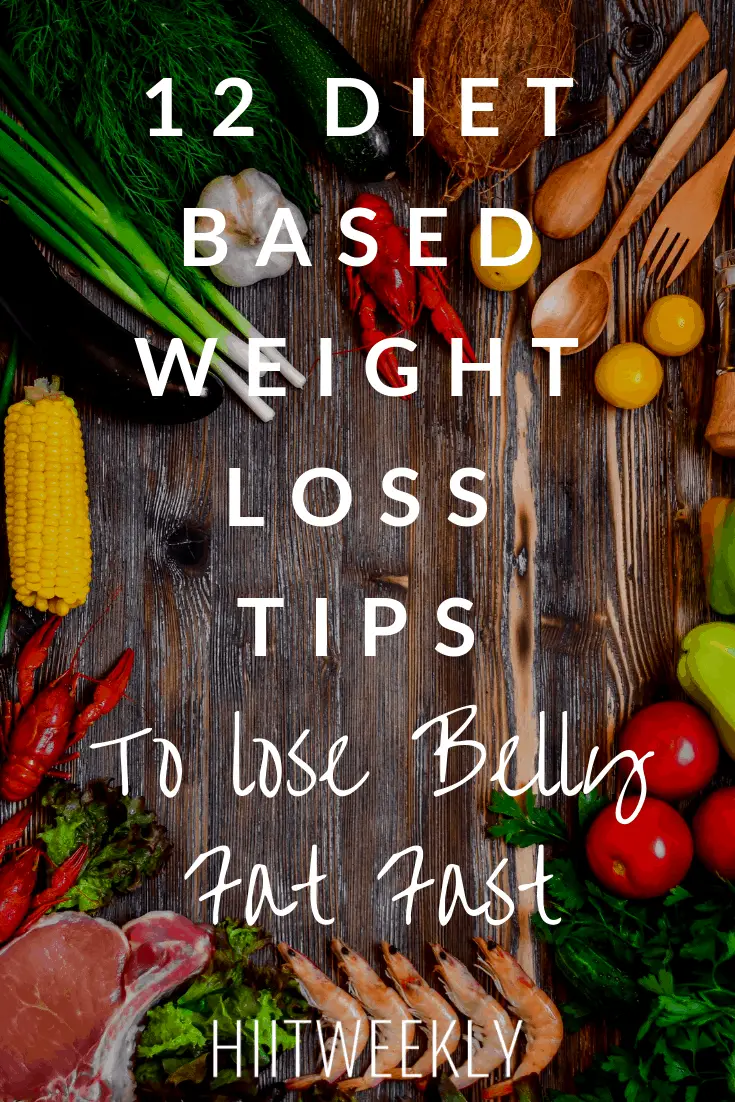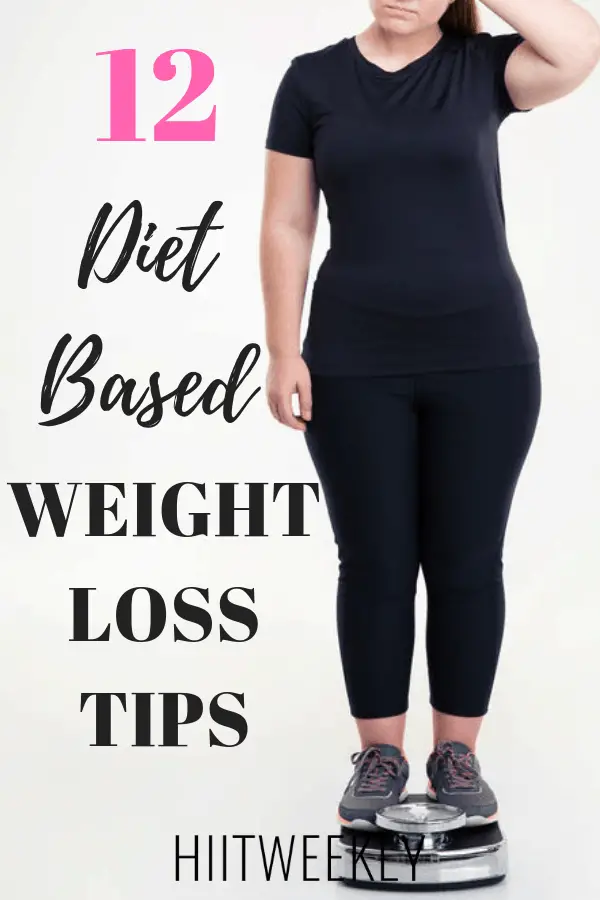
If you want to lose weight you must look at your diet, here are our 12 diet based weight loss tips to help you lose belly fat fast!
Welcome to HIIT Weekly, we help women like you lose weight and get in amazing shape through home high intensity interval training.
You must have heard by now that food and diet is the key contributor to getting rid of any unwanted body fat. You could exercise 2-3 hours a day and still not lose weight if you overeat. With this in mind, we’ve come up with 12 of our best diet based weight loss tips that we give to our clients when they start any weight loss journey with us.
Print this list and keep it on show so you can live by these tips over the course of your weight loss journey.
Don’t forget to check out our 7 day challenge here once you’ve finished reading this post. It’s got a free 7 day diet and exercise plan to help you drop weight fast.
Related – The Ultimate Weight Loss Guide
12 Diet Based Weight Loss Tips
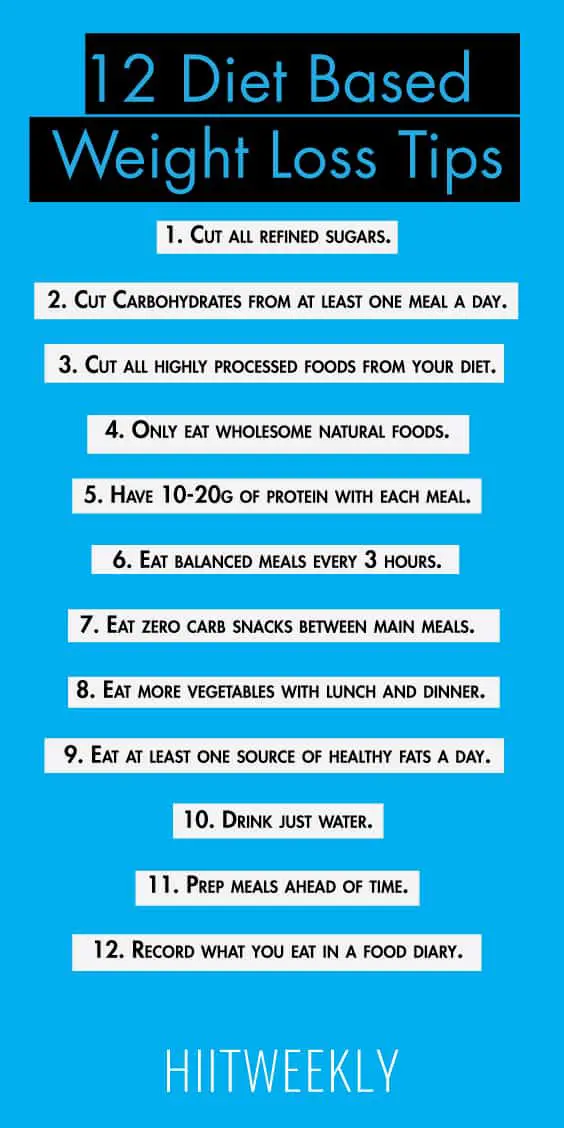
1. Cut all refined sugars.

It’s important to note that while cutting refined sugars is beneficial for weight loss, a balanced and sustainable approach to nutrition, including a variety of whole foods, is key to long-term health and weight management. Additionally, individual responses to dietary changes may vary, so it’s advisable to consult with a healthcare professional or a registered dietitian for personalized advice.
Here are several reasons why reducing your refined sugar intake can help you in your weight loss journey.
- Calorie Reduction:
- Refined sugars, often found in processed foods and sugary beverages, are calorie-dense and offer little nutritional value. By cutting these empty-calorie sources, you reduce overall calorie intake, creating a calorie deficit that is essential for weight loss.
- Reduced Insulin Spikes:
- Refined sugars cause a rapid spike in blood sugar levels, leading to a corresponding increase in insulin secretion. Elevated insulin levels can promote fat storage, especially around the abdominal area. Cutting refined sugars helps regulate blood sugar levels and reduces the likelihood of excess insulin secretion.
- Prevention of Sugar-Induced Cravings:
- Consuming refined sugars can trigger cravings for more sugary foods. Cutting these sugars helps break the cycle of cravings, making it easier to make healthier food choices and control overall calorie intake.
- Fat Storage Reduction:
- Excess sugar in the bloodstream that isn’t used for energy is converted into fat and stored in adipose tissue. By reducing sugar intake, the body is less likely to store excess sugar as fat, supporting weight loss efforts.
- Improved Metabolic Health:
- High sugar consumption has been linked to insulin resistance, a condition where cells become less responsive to insulin. Insulin resistance is associated with weight gain and an increased risk of type 2 diabetes. Cutting refined sugars helps improve insulin sensitivity and overall metabolic health.
- Enhanced Fat-Burning Capability:
- When your body is not relying on a constant influx of sugars for energy, it becomes more efficient at utilizing stored fat for fuel. This shift towards using fat as an energy source can contribute to weight loss.
- Lowered Risk of Chronic Conditions:
- Excessive sugar consumption is linked to various health issues, including obesity, type 2 diabetes, and cardiovascular diseases. Cutting refined sugars not only supports weight loss but also reduces the risk of developing these chronic conditions.
- Better Appetite Regulation:
- Foods high in refined sugars often lack the fiber and protein needed to promote satiety. As a result, they can lead to overeating. By opting for whole, nutrient-dense foods, you enhance feelings of fullness, making it easier to control portion sizes and avoid excessive calorie consumption.
2. Cut carbohydrates from at least one meal a day.
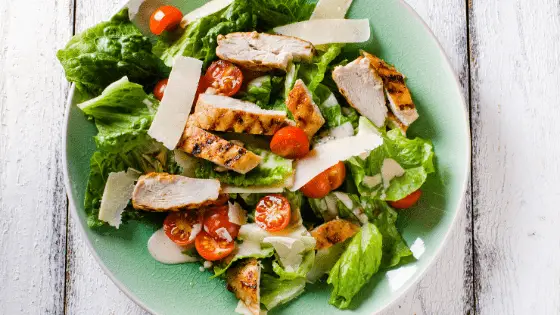
It’s important to note that not all carbohydrates are equal, and complex carbohydrates found in whole grains, fruits, and vegetables are important sources of fiber, vitamins, and minerals. The decision to cut or reduce carbohydrates should be based on individual preferences, health goals, and any existing medical conditions.
Before making significant changes to your diet, it’s advisable to consult with a healthcare professional or a registered dietitian. They can provide personalized guidance based on your health status, dietary preferences, and weight loss goals.
Additionally, a balanced and sustainable approach to nutrition is crucial for long-term success and overall health.
Reducing your carbs will help your body burn more fat. Cutting all carbs is not necessary unless you want a fast weight loss over say 3-6 weeks. It’s just not sustainable in the long term. Try to have them with either lunch or dinner but not both. When you do try to stick to grains or sweet potato.
Here are some more reasons why reducing your carohydrate intake could help you to lose weight.
- Caloric Reduction: Carbohydrates contribute to the overall calorie content of a diet. By reducing carbohydrate intake, individuals can create a caloric deficit, which is essential for weight loss. Consuming fewer calories than the body needs promotes the use of stored fat for energy, leading to weight loss.
- Insulin Regulation: Carbohydrates, especially refined sugars and simple carbohydrates, can lead to spikes in blood sugar levels, triggering insulin release. Chronically elevated insulin levels may promote fat storage, particularly around the abdominal area. Reducing carbohydrate intake can help regulate insulin levels and support fat loss.
- Water Weight Loss: Carbohydrates are stored in the body as glycogen, and each gram of glycogen is associated with water molecules. When carbohydrate intake is reduced, glycogen stores are depleted, leading to a loss of water weight. This initial weight loss can be motivating for individuals starting a diet.
- Improved Fat Oxidation: In a state of low carbohydrate intake, the body may shift towards using fat for energy, a metabolic state known as ketosis. Some individuals follow low-carbohydrate or ketogenic diets to enhance fat oxidation and promote weight loss.
- Appetite Control: High-carbohydrate meals, especially those with simple sugars, can lead to rapid spikes and crashes in blood sugar levels, influencing hunger and cravings. A diet lower in carbohydrates, particularly refined carbohydrates, may help stabilize blood sugar levels and improve appetite control.
- Reduced Processed Food Intake: Many processed and convenience foods, often high in refined carbohydrates, are also high in calories and low in nutritional value. Cutting back on carbohydrates may lead to a reduction in the consumption of these less nutritious foods.
- Management of Certain Medical Conditions: Some individuals with specific medical conditions, such as insulin resistance or type 2 diabetes, may benefit from reducing carbohydrate intake to better manage blood sugar levels and support weight loss.
3. Cut all highly processed foods from your diet.
You need to do this now. We don’t know what damage they can do to your body in the long term. There’s talk about the risk of cancers related to highly processed foods, especially meat products. They are generally high in bad fats and refined sugars. Try to avoid processed food as much as possible.
Reducing processed food intake is beneficial when trying to lose weight for several reasons:
- High Caloric Density:
- Processed foods often have a high caloric density, meaning they provide a significant number of calories in a small serving size. Consuming these calorie-dense foods can contribute to an excessive calorie intake, making it challenging to maintain a caloric deficit necessary for weight loss.
- Low Nutrient Density:
- Processed foods are often low in essential nutrients such as vitamins, minerals, and fiber. When individuals rely on these foods, they may not be getting the necessary nutrients for overall health. A nutrient-dense diet is important for supporting bodily functions, energy levels, and overall well-being.
- Added Sugars and Unhealthy Fats:
- Many processed foods contain added sugars, unhealthy fats, and artificial additives to enhance flavor, texture, and shelf life. These additives can contribute to excessive calorie consumption and may lead to increased fat storage, hindering weight loss efforts.
- Increased Appetite and Cravings:
- Processed foods, especially those high in refined sugars and low in fiber, can lead to rapid spikes and crashes in blood sugar levels. This can result in increased hunger, cravings, and a higher likelihood of overeating, making weight loss more challenging.
- Poor Satiety and Overeating:
- Processed foods often lack the satiating effects of whole, minimally processed foods. As a result, individuals may consume more calories before feeling satisfied, leading to overeating and difficulty in maintaining a calorie deficit.
- Influence on Hormones and Metabolism:
- Some processed foods may impact hormonal regulation and metabolism, potentially promoting weight gain. For example, certain additives and preservatives in processed foods may disrupt hormonal signaling related to hunger and satiety.
- Portion Control Challenges:
- Many processed foods come in convenient, pre-packaged portions that may encourage overconsumption. These pre-packaged servings may lead individuals to consume more calories than they would with whole, unprocessed foods.
- Increased Risk of Insulin Resistance:
- Diets high in processed foods, particularly those with added sugars and unhealthy fats, are associated with an increased risk of insulin resistance. This condition can hinder the body’s ability to regulate blood sugar levels and may contribute to weight gain.
By focusing on whole, minimally processed foods, individuals can improve the nutritional quality of their diet, control calorie intake, and support their weight loss goals. Whole foods, such as fruits, vegetables, lean proteins, and whole grains, provide essential nutrients, promote satiety, and contribute to overall health. Additionally, emphasizing whole foods encourages a more balanced and sustainable approach to nutrition, facilitating long-term weight management.
4. Only eat wholesome natural foods.

Living the clean life. Whole foods just mean food as mother nature made it without being processed. You’ll struggle to overeat if you stay within the clean eating rules.
- Nutrient-Packed for Weight Loss Success:
- Wholesome, natural foods are nutrient powerhouses, offering essential vitamins, minerals, and antioxidants. This nutrient density supports your body’s needs while helping you achieve weight loss goals.
- Satiety for Controlled Hunger:
- Packed with fiber and protein, natural foods keep you feeling full for longer periods, reducing the likelihood of snacking and aiding in weight management by controlling hunger.
- Balanced Nutrition for Weight Loss:
- Enjoying a variety of natural foods provides a balanced mix of macronutrients, supporting weight loss by supplying sustained energy, promoting muscle health, and preventing nutrient deficiencies.
- Stable Energy Levels for Active Lifestyles:
- The complex carbohydrates found in natural foods contribute to stable blood sugar levels, ensuring a steady release of energy. This sustained energy is beneficial for maintaining an active lifestyle, crucial for weight loss success.
- Gut Health and Digestive Harmony:
- Natural foods, particularly those rich in fiber, promote optimal digestive health. A healthy gut aids in efficient nutrient absorption and helps regulate metabolism, essential for effective weight loss.
- Avoidance of Processed Additives for Healthier Choices:
- By choosing natural foods, you steer clear of the artificial additives and unhealthy fats commonly found in processed foods. This supports overall health and aligns with weight loss objectives.
- Calorie Control with Nutrient-Dense Options:
- Natural foods often have lower caloric density than processed alternatives, allowing you to enjoy more substantial portions without excessive calorie intake. This control is pivotal for weight loss success.
- Reduced Risk of Weight-Related Health Issues:
- Adopting a diet rich in wholesome, natural foods is associated with a lower risk of weight-related health concerns. The abundance of antioxidants and anti-inflammatory compounds contributes to overall health and reduces disease risk.
- Sustainable, Enjoyable Weight Loss Journey:
- Focusing on natural, whole foods promotes a sustainable approach to weight loss. Seasonal, locally sourced produce ensures variety, supporting a long-term, enjoyable journey towards your weight loss goals.
- Flavorful Choices for Weight Loss Success:
- Natural foods offer genuine flavors that can be more satisfying than processed alternatives. Rediscover the pleasure of fresh fruits, vegetables, whole grains, and lean proteins as you embark on your weight loss journey.
Remember, weight loss is a holistic process, and incorporating a range of nutrient-dense foods, along with other healthy lifestyle habits, contributes to sustainable success. Tailor your choices to fit your preferences, dietary needs, and individual weight loss goals.
- Related – How To Safely Lose Weight Fast
5. Have 10-20g of protein with each meal.
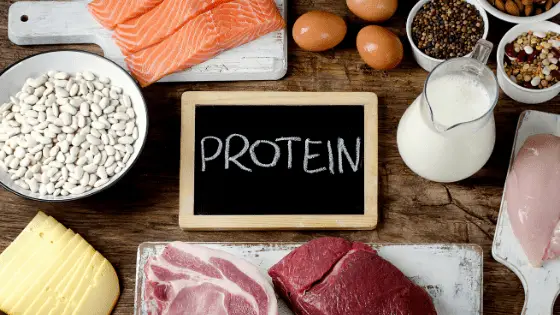
As you’ve cut your carbs right down you’ll still need energy and that will come from fibrous vegetables and proteins. The 10-20g serving size should be enough to aid protein synthesis and stop any muscle proteins being used for energy.
Increasing protein intake can be beneficial when trying to lose weight for several reasons:
- Appetite Control:
- Protein is highly satiating, meaning it helps you feel full and satisfied. By including more protein in your diet, you may naturally consume fewer calories, making it easier to maintain a caloric deficit, a key factor in weight loss.
- Muscle Preservation:
- When you’re in a calorie deficit for weight loss, there’s a risk of losing not just fat but also lean muscle mass. Adequate protein intake supports muscle preservation, ensuring that the weight lost comes primarily from fat rather than muscle tissue.
- Energy Expenditure and Thermogenesis:
- The process of digesting and metabolizing protein requires more energy compared to carbohydrates or fats. This is known as the thermic effect of food (TEF). Increasing protein intake can slightly boost your overall daily energy expenditure, contributing to weight loss.
- Enhanced Fat Burning:
- Protein has a higher thermogenic effect compared to other macronutrients, meaning it requires more energy for the body to digest and process. This increased energy expenditure can contribute to the burning of stored fat.
- Blood Sugar Regulation:
- Including protein in meals helps regulate blood sugar levels, preventing rapid spikes and crashes. This stable blood sugar response can contribute to better appetite control and reduced cravings, supporting weight loss efforts.
- Preservation of Lean Body Mass:
- Protein plays a crucial role in maintaining and repairing tissues, including muscles. A higher protein intake supports the preservation of lean body mass, helping you retain muscle even during periods of calorie restriction.
- Increased Feeling of Fullness:
- Protein promotes the release of hormones that signal fullness (such as leptin) while reducing levels of the hunger hormone (ghrelin). This hormonal response can contribute to better appetite regulation and reduced overall food intake.
- Improved Body Composition:
- A higher protein intake, combined with regular resistance training, can contribute to improvements in body composition. This means a greater percentage of weight lost comes from fat, leading to a leaner and more toned appearance.
- Muscle Repair and Recovery:
- If you engage in regular physical activity, especially resistance training, protein is crucial for the repair and recovery of muscles. This helps you perform well in your workouts, supporting your overall fitness goals during weight loss.
- Metabolic Rate Maintenance:
- Preserving lean muscle mass through adequate protein intake helps maintain your basal metabolic rate (BMR). A higher BMR means your body continues to burn more calories at rest, supporting weight maintenance after the initial weight loss.
When increasing protein intake for weight loss, it’s important to choose lean protein sources such as poultry, fish, lean meats, tofu, legumes, and low-fat dairy products. Consulting with a registered dietitian or nutritionist can help you determine the right protein intake for your individual needs and weight loss goals.
6. Eat balanced meals every 3 hours.

There are many ways and theories on how often you should eat but in our experience eating every three or so works well for most people and fits into a lot of different lifestyles.
Eating regular healthy and balanced meals throughout the day will help make you feel less hungry thus reducing the chances of you straying from your healthy diet.
Here’s what that might look like;
- 8am breakfast
- 11am snack
- 1pm lunch
- 4pm snack
- 7pm dinner
7. Eat zero carb snacks.
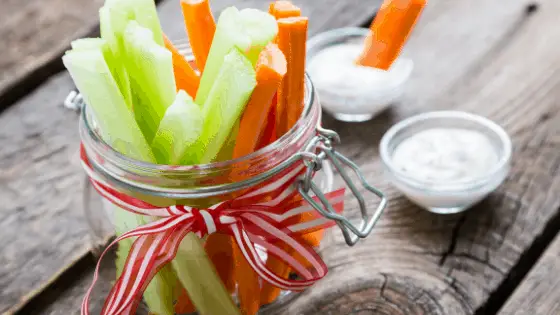
Treat snacks as an aid to avoid feeling hungry between main meals. Just enough food to help with muscle repair, keep energy levels up so you can still burn fat and get you through to the next main meal.
See these grab and go healthy snacks to help you lose weight faster.
8. Eat more vegetables with lunch and dinner.
When you’re on a low-carb diet you’ll need to fill up on vegetables to fill the void in the bottom of your stomach.
9. Eat at least one source of healthy fats a day.
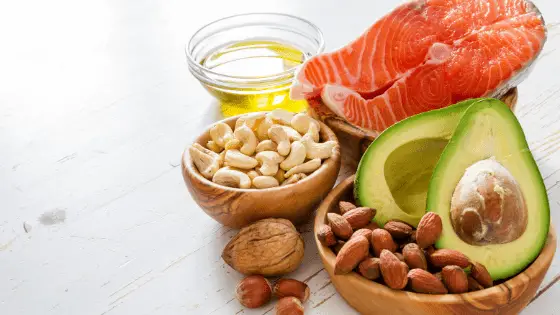
Healthy fats help to break down old fats within the fat cells and set them free into the bloodstream for metabolism.
Including healthy fats in your diet can be beneficial when trying to lose weight. Healthy fats play several important roles in supporting weight loss and overall health. Here are some reasons why incorporating healthy fats is a good idea:
- Satiety and Appetite Control:
- Fats contribute to a feeling of fullness and satiety, helping to control appetite. Including healthy fats in your meals can help you feel satisfied, reducing the likelihood of overeating or snacking on unhealthy, high-calorie foods.
- Balanced Nutrition:
- A well-rounded and balanced diet includes all three macronutrients: carbohydrates, proteins, and fats. Healthy fats provide a source of energy, and including them ensures that your body receives a comprehensive range of nutrients for optimal functioning.
- Stable Blood Sugar Levels:
- Including healthy fats in meals can help stabilize blood sugar levels. When meals contain a balance of macronutrients, including fats, it can slow down the absorption of sugars, preventing rapid spikes and crashes in blood sugar. This is important for managing hunger and cravings.
- Nutrient Absorption:
- Some vitamins and nutrients, such as vitamins A, D, E, and K, are fat-soluble, meaning they require dietary fat for absorption. Including healthy fats in your diet ensures that your body can effectively absorb and utilize these essential nutrients.
- Support for Hormone Production:
- Fats play a role in the production of hormones, including those involved in metabolism and weight regulation. Adequate fat intake supports hormonal balance, which is important for overall health and weight management.
- Brain Health:
- The brain is composed of a significant amount of fat, and consuming healthy fats is essential for cognitive function and overall brain health. Including omega-3 fatty acids, found in fatty fish, flaxseeds, and walnuts, is particularly beneficial.
- Anti-Inflammatory Properties:
- Healthy fats, such as those found in avocados, nuts, and olive oil, have anti-inflammatory properties. Chronic inflammation can contribute to various health issues, including obesity, and including these fats may help mitigate inflammation.
- Sustainable Energy:
- Fats are a concentrated source of energy, providing a steady and sustainable fuel source. Including healthy fats in your diet can help maintain energy levels throughout the day, reducing the likelihood of energy crashes.
- Metabolic Health:
- Including healthy fats can support metabolic health by improving insulin sensitivity. This is important for the efficient use of glucose and can contribute to weight management.
- Improved Taste and Satisfaction:
- Healthy fats can enhance the taste and palatability of meals, making your diet more enjoyable. When meals are satisfying and tasty, it becomes easier to adhere to a healthy eating plan.
Examples of healthy fats include avocados, nuts, seeds, olive oil, fatty fish (like salmon and trout), and coconut oil. It’s important to be mindful of portion sizes, as fats are calorie-dense. Balancing your fat intake with other macronutrients and choosing nutrient-dense sources is key for a healthy and effective weight loss approach. Consult with a healthcare professional or a registered dietitian for personalized advice based on your individual needs and goals.
10. Drink just water

Your body is roughly 60-65% water, don’t deprive it of what it desperately needs to function properly.
Give it up unless it’s water. Staying hydrated will aid in your fat loss and keep your body working in top shape. Avoid drinking calories unnecessarily.
While water is a crucial component of a healthy lifestyle and can indirectly support weight loss, it’s important to recognize that it works in conjunction with a balanced diet and regular physical activity. Drinking enough water is essential for various bodily functions, and dehydration can negatively impact health and well-being.
For optimal hydration, aim to consume an adequate amount of water throughout the day. Individual water needs vary, but a general guideline is to drink at least 8 cups (64 ounces) of water per day, and more if you’re physically active or in a hot climate. Listen to your body’s thirst signals and adjust your water intake accordingly. Always consult with a healthcare professional or registered dietitian for personalized advice based on your health status and individual needs.
11. Prep meals ahead of time.
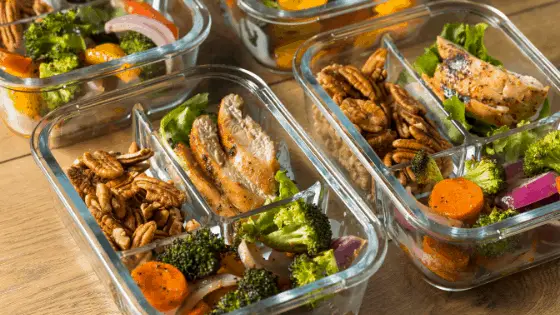
Whether it’s on a piece of paper so you know what you’re having or you physically make the meals ahead of time, just be prepared or risk going off the rails.
Meal prepping for weight loss offers several advantages and can be a helpful strategy in achieving your health and fitness goals. Here are some reasons why meal prepping can support weight loss:
- Portion Control:
- Meal prepping allows you to control portion sizes and create balanced meals with the right mix of macronutrients (carbohydrates, proteins, and fats). This helps prevent overeating and ensures that you’re consuming the appropriate number of calories for weight loss.
- Calorie Management:
- Planning and preparing meals in advance enables you to calculate and manage your daily calorie intake more effectively. This is crucial for creating a calorie deficit, which is necessary for weight loss.
- Nutrient-Dense Choices:
- When you meal prep, you have the opportunity to include a variety of nutrient-dense foods in your meals, such as lean proteins, whole grains, fruits, and vegetables. This ensures you get the essential vitamins and minerals your body needs for optimal health.
- Reduced Impulse Eating:
- Having pre-prepared meals readily available minimizes the temptation to grab convenient, often less healthy, and calorie-dense options when you’re hungry. This can help you stay on track with your weight loss goals.
- Time Efficiency:
- Meal prepping saves time during the week. With prepared meals, you can quickly grab a healthy option, reducing the likelihood of opting for fast food or unhealthy snacks due to time constraints.
- Consistent Eating Patterns:
- Regular and consistent eating patterns can help regulate blood sugar levels and manage hunger. Meal prepping allows you to stick to a schedule, promoting a more structured and controlled approach to eating.
- Customization to Dietary Preferences:
- When you prepare your meals, you have control over the ingredients and can tailor your meals to your dietary preferences, including any specific dietary restrictions or preferences you may have.
- Financial Savings:
- Planning and cooking your meals in bulk can be cost-effective compared to frequently dining out or ordering takeout. This can result in financial savings while supporting your weight loss efforts.
- Mindful Eating:
- Meal prepping encourages mindful eating by promoting awareness of what and how much you’re consuming. This mindfulness can contribute to better food choices and improved portion control.
- Accountability and Consistency:
- Knowing that your meals are prepped and ready can help you stay accountable to your weight loss goals. Consistency is key in developing sustainable, healthy eating habits.
Remember to include a variety of foods in your meal prep to ensure a balanced and enjoyable diet. Also, consult with a healthcare professional or registered dietitian to personalize your meal plan based on your individual nutritional needs and weight loss goals.
See our meal prep guide here.
Here’s a list of 70+ recipes that are ideal for meal prep – Healthy Meal Prep Recipes
12. Record what you eat in a food diary.

Recording what you eat is a good way to keep track of everything, seeing what you’ve had throughout the day or week can help you stay motivated. Knowing that you ate badly early on in the day might dissuade you from doing it again. Similarly knowing that you’ve had a great week will help you focus to continue that winning streak.
Remember, print these out and keep them handy. It’s so easy to forget what to do. Keep focused and keep on getting fitter, stronger and leaner.
Need more help losing weight?
Lose weight and get in great shape with our 6 Week Flat Belly Challenge. Where we guide you through our diet and exercise plan designed to help you drop the pounds fast while transforming your body shape.

The plan will help you learn new healthy habits, helping you to lose weight long into the future.
The program comes complete with a food guide, our HIIT workouts with videos and more that can all be done at home or at the gym.
Click Here To Learn More About The 6 Week Flat Belly Challenge

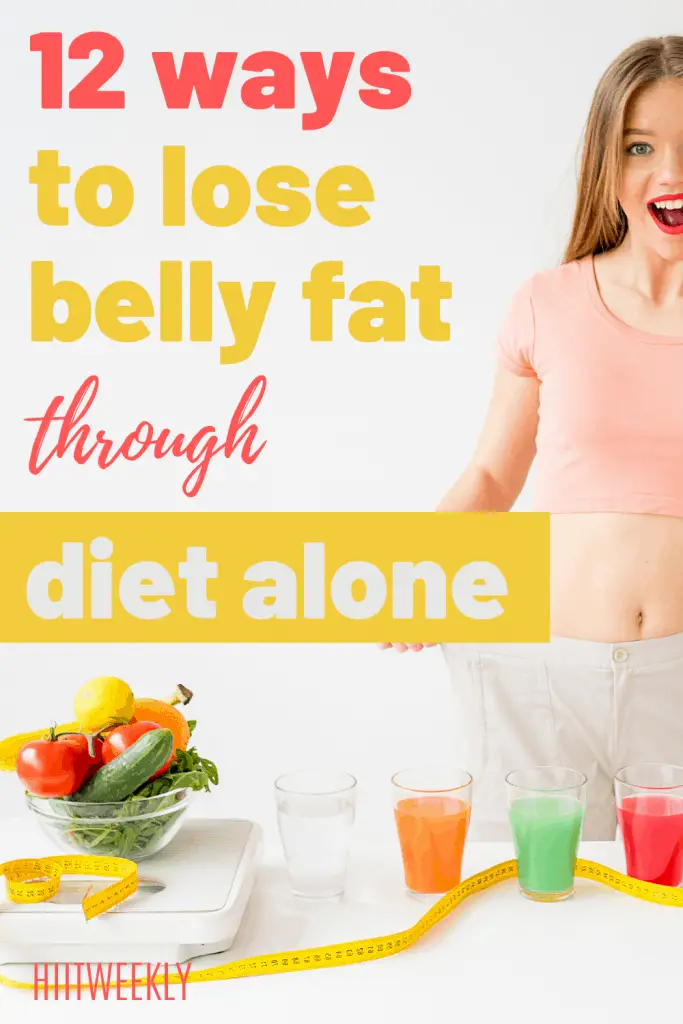
Hey there, I’m Luke, and I’ve been immersed in the fitness world since 2007. From gym floors to running my own personal training business, I’ve seen it all. My journey led me to study Sports Science at university, where I deepened my understanding of the science behind exercise.
One thing that truly lights my fire? High-Intensity Interval Training (HIIT). It’s not just a workout; it’s a game-changer. I’ve used HIIT to help countless men and women shed weight and transform their lives for the better.
Through my personal training business, I’ve witnessed the incredible impact of HIIT on both physical and mental well-being. It’s not just about getting fitter; it’s about feeling stronger, more confident, and more resilient.
Join me on this journey to a healthier, happier you. Let’s crush those goals together!
